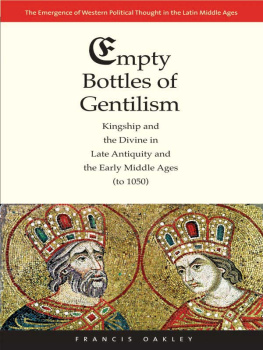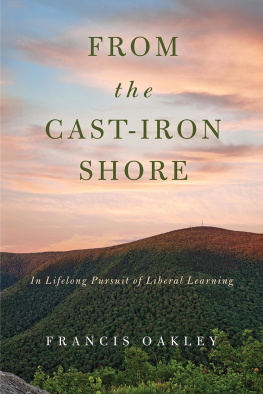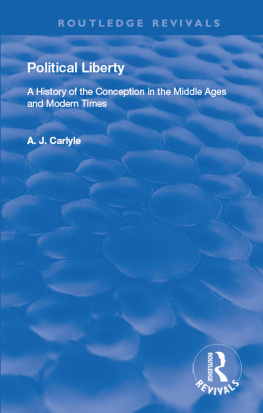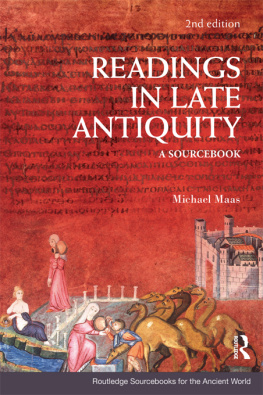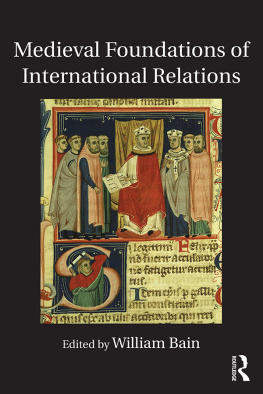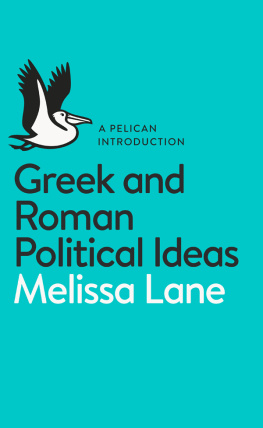The Emergence
of Western Political
Thought in the
Latin Middle Ages
The Emergence
of Western Political
Thought in the
Latin Middle Ages

VOLUME ONE
Empty Bottles of Gentilism:
Kingship and the Divine in
Late Antiquity and
the Early Middle Ages
(to 1050)
VOLUME TWO
The Mortgage of the Past:
Reshaping the Ancient Political
Inheritance
(10501300)
VOLUME THREE
The Watershed of Modern Politics:
Law, Virtue, Kingship,
and Consent
(13001650)
Empty Bottles
of Gentilism
Kingship and the Divine in Late
Antiquity and the Early Middle Ages
(to 1050)

FRANCIS OAKLEY
Yale UNIVERSITY PRESS
New Haven and London
Published with assistance from the foundation established in memory of Calvin Chapin of the Class of 1788, Yale College.
Copyright 2010 by Francis Oakley
All rights reserved.
This book may not be reproduced, in whole or in part, including
illustrations, in any form (beyond that copying permitted by
Sections 107 and 108 of the U.S. Copyright Law and except
by reviewers for the public press), without written
permission from the publishers.
Designed by Sonia Shannon.
Set in Filosofia type by Integrated Publishing Solutions.
Printed in the United States of America.
Library of Congress Cataloging-in-Publication Data
Oakley, Francis.
Empty bottles of gentilism : kingship and the divine in late antiquity and the
early Middle Ages (to 1050) / Francis Oakley.
p. cm. (The emergence of Western political thought in the Latin Middle Ages; 1)
Includes bibliographical references and index.
ISBN 978-0-300-15538-9 (cloth : alk.paper)
1. Kings and rulersEuropeHistoryTo 1500. 2. Church and state
EuropeHistoryTo 1500. 3. Middle Ages. I. Title.
JC375.O34 2010 321.6dc22 2009032624
A catalogue record for this book is available from the British Library.
This paper meets the requirements of ANSI/NISO Z39.481992 (Permanence of Paper).
10 9 8 7 6 5 4 3 2 1
To
Corpus Christi College
Oxford
If a man could well observe that which is delivered
in the histories, concerning the religious rites
of the Greeks and Romans, I doubt not but he might
find many [of those] old empty bottles
of Gentilism, which the doctors of the Roman Church,
either by negligence or ambition, have filled up again
with the new wine of Christianity, that will not fail in
time to break them.
THOMAS HOBBES , Leviathan, pt. 4, ch. 45
General Introduction

IN THE THREE VOLUMES I plan for this series it is my ambition, let it be confessed, not simply to address, and in adequate depth, the political thinking of the centuries labeled by stubborn historiographical convention as medieval but also to effect something of a shift in the perspective from which we characteristically view that body of thought. And, beyond that, to engineer, if I at all can, a modest measure of reshaping in the constitutive narrative that has long served to frame the way in which we understand the full course of Western political thought. No more than implicit, that narrative has served nonetheless to determine the periods to which most attention has usually been paid (classical Greeceor, more accurately, Athensof the fifth and fourth centuries BCE and western Europe of the sixteenth to the twentieth centuries), to foreground the texts on which students have habitually been encouraged to focus (Plato and Aristotle, Machiavelli, the great contract theorists from Hobbes to Kant, the nineteenth-century Utilitarians, and so on), and to frame the interpretative perspective from which those texts have usually been approached. In that formative narrative, it is fair to say, the medieval contribution has never bulked all that large. Certainly it has never succeeded in finding a place under the bright lights of center stage. Instead, the Middle Ages have characteristically been seen as standing out in the long history of Western political thinking as something of an aberration, as a deviation from the norm, as a period in which the natural categories of political thinking were pushed to one side by religious motifs of supernatural bent.
Thus despite a century and more of cumulative endeavor in the fields of cultural anthropology and comparative religion, we continue to hear about the essentially secular unity of life in the classical age and about the Hellenistic propensity for introducing the supernatural into politics. We are still reminded that Christianity made purely political thought impossible, that the peculiar problem of Church and State, which Christianity introduced, involved the greatest perturbation which has ever drawn mens thoughts about the state out of their properly political orbit, that Medieval Europe offers for the first time in history the paradoxical spectacle of a society trying to organize itself politically on the basis of a spiritual framework, and that it was only with the collapse of the medieval ideal of a Christian commonwealth that there occurred a return to a more purely political conception of the State. Implicit in this view is the assumption that despite all surface differences there is a fundamental continuity between modern political thought and that of the classical world, both periods being committed, presumably, to the natural and secular modes of analysis proper to purely political thought.
I would venture to suggest, however, that that way of looking at things is destined to change if one makes the bracing effort to approach and judge the European and Western political experience from the outside as well as the inside and to see it, especially, from the broader perspective afforded by a reflective engagement with the millennial unfolding of universal or world history. In this work, then, it is my endeavor to do precisely that.
Adopt that perspective, of course, and the transition from the archaic and classical (or, indeed, from the world of Celtic and Germanic paganism) to the Christian outlook emerges as a shift, not so much from a secular to a religious viewpoint, as from one ancient and widespread mode of religious consciousness to another and radically different one. In effect, the historical rhythm that one finds emerging from the ebb and flow of ideas is not a secularreligioussecular one, but rather, religiousreligioussecular. Adopt that perspective, too, and ones attention is inevitably drawn not simply to the marked secularity characteristic of political thinking in the modern era but also to some other of its features that are, historically speaking, really quite singularnamely, its preoccupation with the nation-state and the emphasis it tends to place on the limited, instrumental, artificial nature of that state; the intensity of its focus on the problem of political obligation; its reliance on the notion of consent as the principal route to a resolution of that problem; its specific understanding of consent not in collective terms but as a concatenation of individual acts of willing, and, presupposed by that, its bone-deep commitment to the notion of autonomous individuality, and, with it, its marked preoccupation with the vindication of the subjective rights of individuals.

